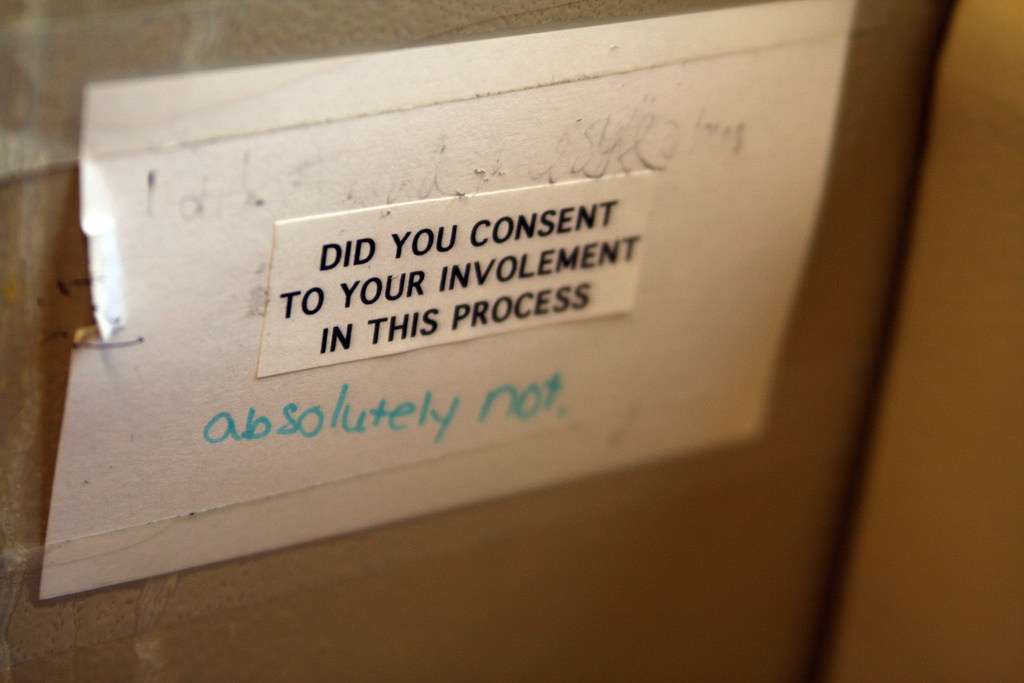Go Home, Consent, You're Drunk


As calls to "end" campus rape reach a fever pitch, I want to highlight a few recent pieces on sexual consent from around the web. California is currently considering "affirmative consent" legislation that would create a separate definition of rape for college students, one in which the absense of "affirmative, conscious, and voluntary" (though not necessarily verbal) agreement to proceed at each step of sexual activity would be considered assault.
One of the biggest areas of controversy in the legislation is a section concerning consent and intoxication. "In the evaluation of complaints in the disciplinary process," the bill states, "it shall not be a valid excuse that the accused believed that the complainant affirmatively consented…if the accused knew or reasonably should have known that the complainant was unable to consent to the sexual activity" because of incapacitation "due to the influence of drugs, alcohol, or medication." Many have pointed out that this standard is awfully vague, leaving much room for discretion in what constitutes too incapacitated to consent.
Megan McArdle suggests that this is a feature, not a bug, for those pushing affirmative-consent policies:
Prosecutors, and regulators more generally, like vague standards that are impossible to enforce consistently. It gives them a great deal of discretion in whom they target and how. It is a threat that can be wielded to force pleas to lesser crimes or other "voluntary" actions that obviate the need for a messy trial they might lose.
If university administrators moved to an affirmative-consent standard by themselves, parents and alumni, particularly the parents of sons, might complain. But if lawmakers force them to it … well, it's another weapon in the arsenal that allows them to target men who, say, generate too many plausible but impossible-to-prove complaints. The part of me that was a potentially vulnerable college woman understands the desire. But the part of me that is suspicious of authorities with broad and vague powers nonetheless thinks we should look for a better way.
At Bustle, Pamela Stubbart considers a sexual assault case from Occidental College and articulates something that's long bothered me about the affirmative consent movement: If drunk people can't give consent, how can they perceive consent?
Everyone understands the intuition that a policy (and more importantly, a real culture) of meaningful consent helps to protect incapacitated people from non-incapacitated (or less-incapacitated) potential assailants. But when both parties in a sexual encounter are (by their own admissions) blackout drunk…it doesn't take a trained philosopher to point out the underlying principle: if fall-down, blackout drunkenness really does incapacitate someone morally and relieve them of responsibility for their actions, for consistency's sake that must count both for ability to give consent and ability to perceive it. The burden might be reasonably placed on the clear initiator to prove that he or she was drunk, but in the Occidental case, neither Jane nor John Doe denies that both were as drunk as can be.
Fortunately, rapists do not get themselves blackout drunk and then go out planning to rape people and "get away with it." When both people are that drunk, and equally drunk, it's usually the result of a voluntary (if ill-advised) organic social situation. Here's the reality of the matter, which is kind of both good and bad news: rape is not some kind of mutual poor decision or drunken accident (which would make it easier to educate or engineer away). Instead, there really are men who prey on women sexually, often by getting them drunk.

Affirmative consent legislation suggests that misinterpreation of consent is a major root of sexual violence. But most rapes are committed by repeat offenders with calculated agendas, not students confused about whether the absense of a 'no' means 'yes'.
"Given the horrors of sexual assault, the desire to do something is powerful and totally understandable," writes Freddie de Boer. "But the establishment of explicit consent policies strikes me as a perfect example of the flawed thinking of 'we need to do something, this is something, therefore we need to do this.'" He, too, sees affirmative consent laws as promoting misunderstanding about rape:
Rapists are those who engage in sexual behaviors against others who have not consented to those behaviors. Whether the standard is "no means no" or "only yes means yes," rapists will violate that standard, because they are rapists. Perhaps such policies will make it easier to prosecute cases against offenders, but again—it is as easy for someone to claim after the fact that he asked for and received a yes as it is to claim after the fact that the other person didn't say no. These policies seem only to solve problems under the assumption that many rapes are so-called "gray rapes," and yet anti-rape activists have long worked to insist that there is no such thing, or that such situations are quite rare.
De Boer also sees hypocrisy in attempting to promote individual agency and autonomy by requiring that agency be used in a very particular way:
One of the most important parts of the feminist project is insisting that women own their own bodies. This has application to abortion, where the pro-life movement seeks to take physical control of women's bodies away from them. And it has application to rape. The insistence of those who work against rape is that only the individual has the right to define appropriate and wanted sexual practice. With the informed consent of all adult parties, no sexual practice is illegitimate. Without that consent, no sexual practice is permissible. This is a humane, moral standard that has the benefit of simplicity in application and clarity in responsibility.
But it stems first and foremost from the recognition of individual ownership. To define the exact methods through which individuals can request and give consent takes away that control and turns it over to the state, or even more ludicrously, to a dean or some academic grievance board. We should be expanding the individual's control over their own sexual practice, not lessening it. And we should maintain the simplest standard that there is: that if a person rejects a sexual advance, or is in such an incapacitated state that they cannot rejected that advance, or is under the power of the other party to the extent that they feel compelled to consent, sexual contact cannot morally or legally take place.
Yet mainstream feminists have taken up the cause of affirmative consent on campus with vigor. It seems to epitomize critics' charge that these feminists are only concerned with the problems of the privileged and middle-class. Only about one-third of Americans ever earn a college degree. Only about six percent of Americans are currently enrolled in college, and far less on traditional college campuses. Why are the intricacies of consent for this population so much more important than, say, finding funding to test the backlog of rape kits—something that could help catch existing rapists and protect people regardless of their educational attainment (or incapacitation) level?
Editor's Note: As of February 29, 2024, commenting privileges on reason.com posts are limited to Reason Plus subscribers. Past commenters are grandfathered in for a temporary period. Subscribe here to preserve your ability to comment. Your Reason Plus subscription also gives you an ad-free version of reason.com, along with full access to the digital edition and archives of Reason magazine. We request that comments be civil and on-topic. We do not moderate or assume any responsibility for comments, which are owned by the readers who post them. Comments do not represent the views of reason.com or Reason Foundation. We reserve the right to delete any comment and ban commenters for any reason at any time. Comments may only be edited within 5 minutes of posting. Report abuses.
Please to post comments


"My Doctor says I have the body of a libertarian!" "Well give it back, you're getting it all wrinkled."
Fortunately, rapists do not get themselves blackout drunk and then go out planning to rape people and "get away with it." When both people are that drunk, and equally drunk, it's usually the result of a voluntary (if ill-advised) organic social situation.
Which begs the obvious question. If both parties are drunk, why is it that we are to assume that the man is guilty of raping the woman? It strikes me that, unless you want to claim that women lack moral agency (which gravitates against their having the franchise, being able to enter contracts, etc.), you have to assign equal weight to the claim that the woman raped the man.
Especially on college campuses governed by Title IX, where women and men are required by law to be treated exactly equally.
Yes, it is a terribly sexist assumption that men are the ones who ask for consent and women are the ones who give it.
Without that assumption, you have the absurd situation where two people mutually rape each other in a drunken hookup.
it begs the question, and raises one too!
That's where prosecutorial discretion enters the picture.
Wouldn't be easier just to mandate that everyone attending the college be fitted with electronic chastity belts, which can only be opened from the university's web site?
Logs in
**mistypes password** curses
Gets locked out
Resets password
Waits for email. Sets password to 'password'.
Click's the "I accept the terms of this sexual encounter" TOS checkbox
Types Captcha code
Types it again, misreading the first time
Requests audio presentation of code
Watches mandatory 10 minute educational video on sexual violence
Loses boner
Problem solved.
Hmmm...you may be on to something here...
(kiss of death endorsement)
This is genius!
Excellent. And just think of the JOBS!
Finally. Someone who wants to teach men not to rape.
And through Skinnerian conditioning at that!
That's covered in the 2nd year Rape Degree program. You can't be taught how *not* to rape without being taught how, first.
Wait until you have to defend your dissertation.
If we teach men not to rape, should we also teach women not to be raped? I know it sounds crazy, but maybe some basic gun and self defense courses. Coupled with basic life lessons for everyone like know your surroundings, don't walk around alone in the shittier parts of town, pick your friends and associates carefully. Or my personal favorite if you get black out drunk you will be at the mercy of every asshole who comes along and wants to assault/rob/kill/draw dicks on your face.
But SKOOL SHOOTINGS.
Personal responsibility is SO patriarchal.
But you're restricting women's freedom to do whatever they want by suggesting that!
You left out a critical step;
Prior to the educational video on violence, there has to be a health video.
Megan McArdle suggests that this is a feature, not a bug, for those pushing affirmative-consent policies:
Prosecutors, and regulators more generally, like vague standards that are impossible to enforce consistently. It gives them a great deal of discretion in whom they target and how. It is a threat that can be wielded to force pleas to lesser crimes or other "voluntary" actions that obviate the need for a messy trial they might lose.
Megan always seems to be hovering around the realization of truth (here) but can go off the deep end-- like when she suggested that no one in the environmental movement wanted you to roll back your lifestyle.
Yeah, I notice that too.
I suspect she keeps one eye on those unsigned Bloomberg editorials, so as not to go too far afield of her employer.
As calls to "end" campus rape reach a fever pitch
This is the new way TEAM OUTRAGE has realized they can often get what they want: just build up the squealing outrage to a fever pitch until legislators/companies/whoever will just do anything to make it go away. Things like Twitter and Facebook make this possible as social media just gets flooded with the drumbeat narrative of the latest outragegasm.
I propose we form TEAM OUTRAGE OUTRAGE. We can be outraged by all the TEAM OUTRAGE. It'll be very meta.
MOAR PICS OF SLUTZ PLZ
Yeah, more pics of Warty's mom plz
She needs to squat more.
Here's the link to the Flickr gallery.
Ugh. I am very disappointed. On the other hand, "We are souls not holes" is kind of poetic. Wrong, but poetic.
You gotta pay the troll toll to get into this girl's hole, you gotta pay the troll toll to get in. You want this baby girl's hole, you come and pay the troll toll, you gotta pay the troll toll to get in.
That episode (like many others) was just this side of disturbing.
Which side?
I see a sign that said FUCK BIGOTS. I don't get it. So, you wanna get laid with this crowd, you gotta bigot?
I find the whole thing very confusing. Do they want to be seen as sluts? Or what is the point? I guess that showing some skin doesn't mean "rape me" is part of it, but does that really need to be explained? I'm pretty sure that the vast majority of rapists do actually know that you aren't actually supposed to rape people.
They don't know, either. The combo of 'dress sexy to attract attention' and 'protest against rape' is just too appealing to your average twenty-something to pass up, even if they don't really have anything to do with one another.
The vast majority of rapists, yes. But there are still an awful lot of responses of "Well, what did she expect, going out dressed in that?" that goes on from the armchair, Monday morning.
incapacitation "due to the influence of drugs, alcohol, or medication." Many have pointed out that this standard is awfully vague
Not only "vague" -- it is much too narrow in its sources of incapacitation. Headache, homesickness, fatigue, PMS, "pumped up over the game", "recently received 'Dear John/Jane letter'" -- to name just a few.
I was sure that this couldn't apply just to college students. Indeed it seems to. So why do college students deserve this supposedly expanded protection while others don't?
Because if you're 21 and still in school, then you're a child.
If we send you to Iraq/Afghanistan at 18, you're an adult with a license to kill (but not drink).
If you look at the text of the proposed law, it's not affecting the criminal statutes on rape or sexual assault. It only affects the definition of consent in college disciplinary policies, where the maximum punishment is expulsion, not jail.
Can we write I CONSENT, in indelible marker, on our partners as a means of consent?
Smart sluts film all their whores giving verbal consent prior to sex. You should probably teach the spawn to do that.
You're high!
Very highly trained clinical specialists struggle with the issue of when someone's capacity to consent is impaired by drugs, illness, etc. Its an issue that comes up all the time in hospitals, and is very difficult to resolve.
The notion that people are going to be able to reach a valid medicolegal opinion on someone's mental capacity during any kind of social encounter is ludicrous in the extreme.
Oh, so you basically support rape.
PATERNALIST MUCH, MM?
Boy on girl is always rape unless unprosecuted. Statute of limitations? You mean limits on statutory rape. Right? No way, patriarch!
Especially, given the fact that, if one party is drunk, the likelihood that the other is also under the influence skyrockets.
"Consent is Sexy"
But those skags are not.
BETTER QUALITY OF SLUTZ PICZ NEXT TIME, PLEEZ
BYU assumes all sexual conduct is the male's fault. Punishment is meted out such. Mormons embody the patriarchy. Why do feminists deplore the patriarchy? Harry Reid embraces it.
Forgot to add: sexual conduct outside of marriage. So I guess I'll answer my own question: marriage IS rape.
It sounds to me, far from delploring the patriarchy, the feminists are in absolute agreement with it.
So, does prostitution count as consent?
Because, of course, college students are dumber (therefore easier to hoodwink) than people who didn't go to college.
my friend's half-sister makes $79 every hour on the laptop . She has been out of a job for nine months but last month her pay was $17055 just working on the laptop for a few hours. see here now....
???????? http://www.netjob70.com
You gave your consent when you gave yourself up to the mercy of those around you. If you do not like sleeping with people you do not know (one night stands) then stop going out and getting blackout drunk. You know yourself, you know what type of drinker you are. If you get frisky after a few to many maybe its wise not to put yourself in a situation where you could be taken advantage of. Or have a designated driver someone you TRUST! that has a moral compass! to look out for you. Pointing the figure after a drunken encounter just sounds like the inability to take responsibility for your actions. Own up to it, seek help, forgive yourself and do not blame others for your drinking problem.